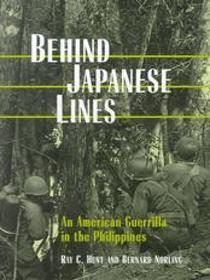Another extraordinary story of a member of The Greatest Generation. I have read numerous books on Americans who fought as guerrillas in the Philippines during World War II and, as are many, this is an inspiring memoir.
It pulls no punches, as many of the things Hunt did during his time in the Philippines would be frowned on by those who lived in less perilous times.
Ray C. Hunt was a staff sergeant in the United States Army Air Corps stationed in the Philippines at the beginning of World War II. After the surrender at Bataan, where he fought as a infantryman, he was forced to take the Bataan Death March with many other American and Filipinos. During the March, he escaped and fled into the hills. He eventually became a noted guerrilla leader on Luzon, where he served for three years behind Japanese lines. Hunt was also promoted to captain by guerrilla leaders during that time.
Just during the five days before the American landings on Luzon, the guerrilla battalion under Hunt's command was credited with killing over 3,000 Japanese soldiers in numerous ambushes and raids.
Hunt continued to serve with the regular U.S. Army after its return to the Philippines, assisting the U.S. Army in fighting the Japanese, while also coordinating guerrilla activities with the Army.
Personally awarded the U.S. Distinguished Service Cross by General Douglas MacArthur, Hunt also received the Bronze Star for his actions during the war.
Hunt left the Philippines in June 1945 to return to the United States. At that time he was only 25 years old.
The above comes from a Wikipedia page I created after reading this book.
It pulls no punches, as many of the things Hunt did during his time in the Philippines would be frowned on by those who lived in less perilous times.
Ray C. Hunt was a staff sergeant in the United States Army Air Corps stationed in the Philippines at the beginning of World War II. After the surrender at Bataan, where he fought as a infantryman, he was forced to take the Bataan Death March with many other American and Filipinos. During the March, he escaped and fled into the hills. He eventually became a noted guerrilla leader on Luzon, where he served for three years behind Japanese lines. Hunt was also promoted to captain by guerrilla leaders during that time.
Just during the five days before the American landings on Luzon, the guerrilla battalion under Hunt's command was credited with killing over 3,000 Japanese soldiers in numerous ambushes and raids.
Hunt continued to serve with the regular U.S. Army after its return to the Philippines, assisting the U.S. Army in fighting the Japanese, while also coordinating guerrilla activities with the Army.
Personally awarded the U.S. Distinguished Service Cross by General Douglas MacArthur, Hunt also received the Bronze Star for his actions during the war.
Hunt left the Philippines in June 1945 to return to the United States. At that time he was only 25 years old.
The above comes from a Wikipedia page I created after reading this book.




